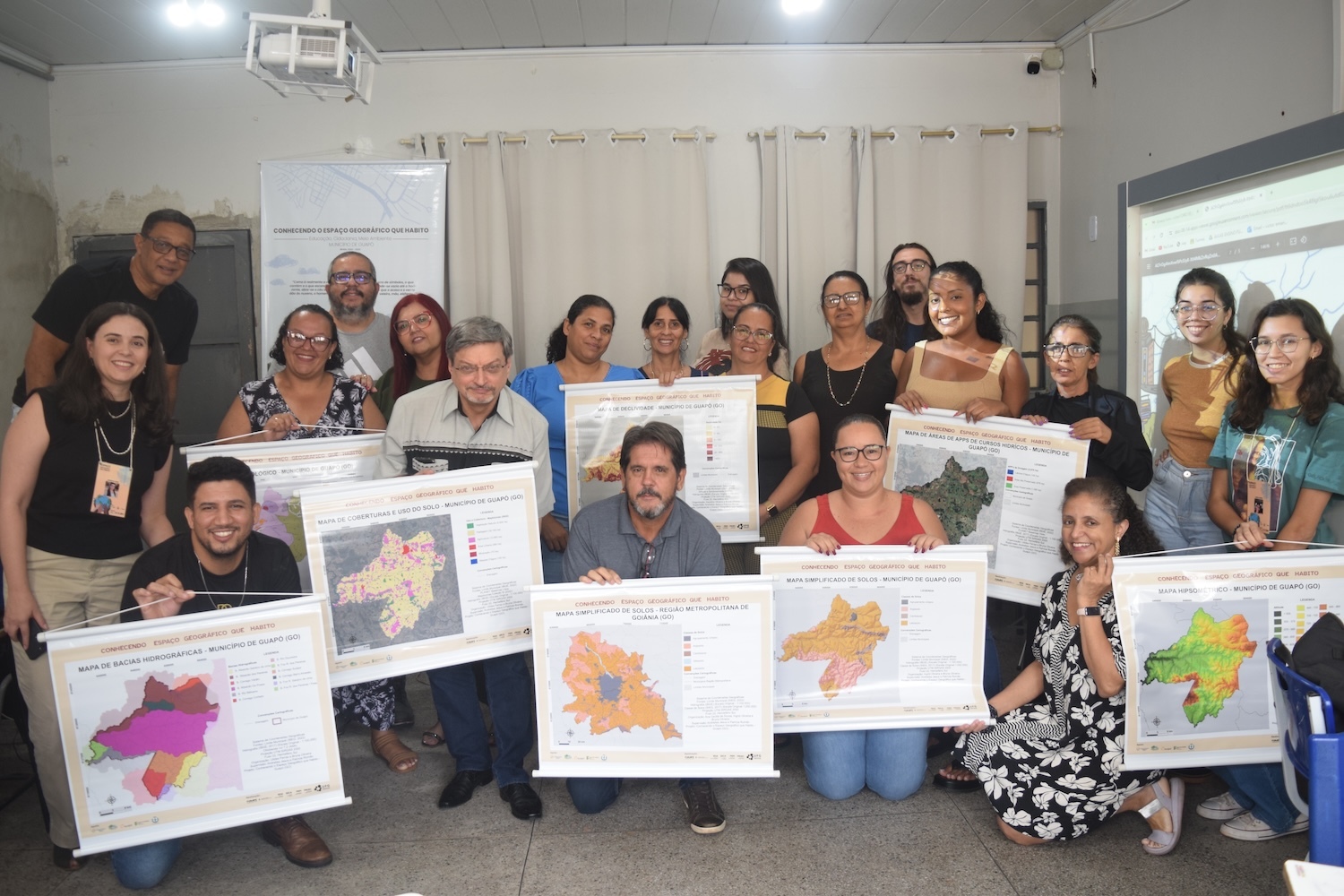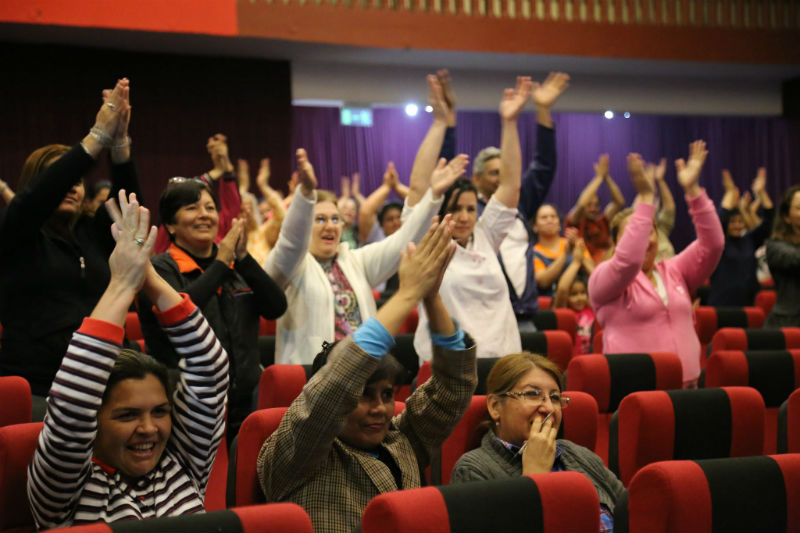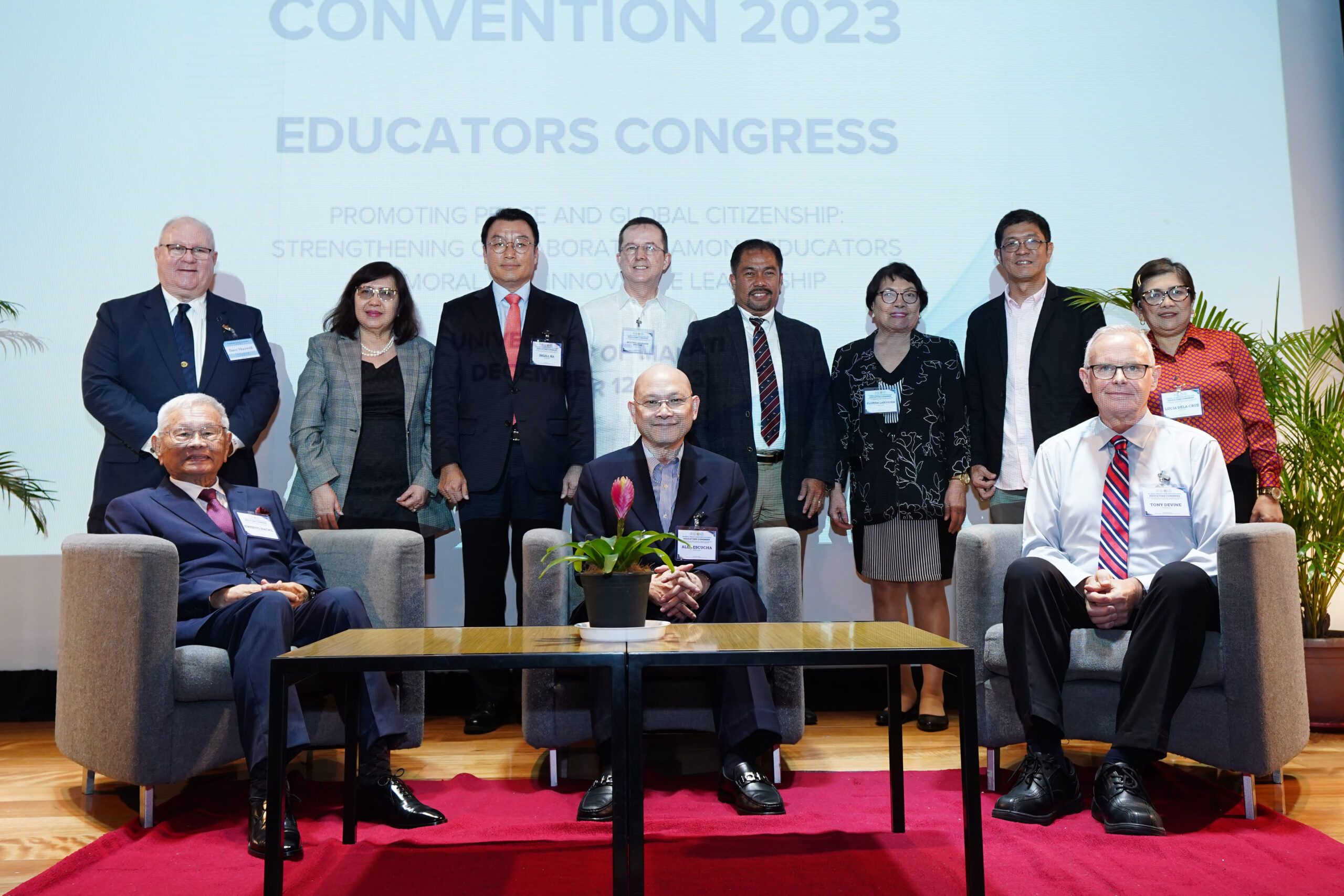Representatives from 40 nations highlight the role of effective leadership in countering extremism, advancing peace and supporting equitable development
Leaders from 40 nations representing governments, faith traditions, business and civil society assembled in Manila, the Philippines on February 28 to advance a common vision for peace and shared prosperity at the seventh Global Peace Convention, “Moral and Innovative Leadership: New Models for Peace and Development.” Hosted by the Global Peace Foundation (GPF) the February 28-March 3 proceedings will include sessions on Interfaith Peacebuilding, Korean Unification, Transforming Education, Youth Leadership and Service, Women’s Leadership Culture, and Global Peace Business and Economy.
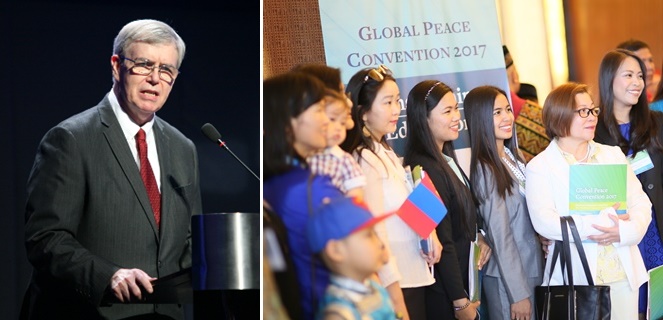
(left to right) GPF International President James Flynn moderating Plenary I, participants of the Global Peace Convention 2017
Welcoming participants, GPF International President James Flynn noted that the convention would touch upon global, regional and local issues but be guided by the imperative for moral and innovative leadership in public affairs and civic life. He called for a shared commitment to develop strategies for resolving the critical divisions and persistent poverty and underdevelopment that afflict much of the human family.
Serving as co-chairs of the international Host Committee, former Philippine President Gloria Arroyo and former Guatemala President Vincio Cerezo also extended greetings to the diverse leaders. In her remarks, President Arroyo especially acknowledged the efforts of GPF chairman Dr. Hyun Jin Moon to build support for Korean unification. She noted that during her presidency the Philippines hosted sessions of Six Party Talks on resolving divisions on the Korean peninsula, and that GPF’s work in Nigeria to bridge religious divides also corresponded efforts initiated in southern Philippines. She thanked GPF for its work to bring solar lights to villages on the Philippines through its All-Lights Village projects. Interfaith cooperation and grassroots development projects are “tried and true approaches” to achieving positive change, she said.
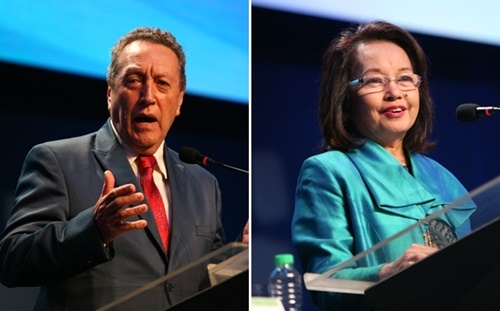
Co-chairs of the international Host Committee, former Guatemala President Vincio Cerezo and former Philippine President Gloria Arroyo
President Cerezo warmly endorsed the guiding ideals of the convention and sponsoring organization and shared a story of his first encounter with GPF, when asked to speak at an event. “I am a politician and I asked myself, ‘What is the right thing to do?’ But I felt the spirit of the people, and heard Dr. Moon speak about how we are all one family, and I felt good because these were my own ideals.”
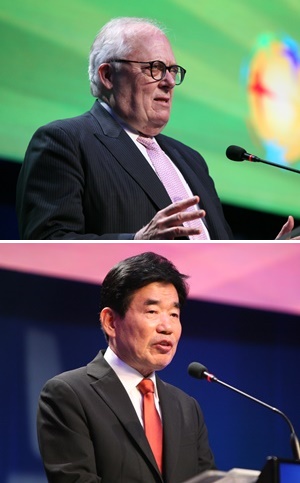
(top-bottom) Korean National Assembly representative Jin-Pyo Kim, Dr. Edwin Feulner, Founder, Chairman of the Heritage Foundation
He also reflected on the growing pace of change which he said is “so fast that most politicians don’t understand what is going on in the world.” He encouraged young people, who are better suited to adapt to the rapid pace of change, to take a leading role and “to participate in this movement with GPF,” and to be equipped with the values that can guide positive change.
Korean National Assembly representative Jin-Pyo Kim used the opportunity to express thanks for the global foreign aid that assisted Korea in its rise from an impoverished, war-torn country into a prosperous modern democracy. “The South Korean people will never forget the warmth of international economic cooperation and support it received,” he said. “South Korea has received $12.8 billion in aid from the international community, and this aid became the cornerstone for the advanced industrialization in Korea today. Thankfully, in 2010, Korea was able to join the OECD Development Assistance Committee, which makes us proud to be the first and only country to transition from a recipient of aid to a donor country.”
The ‘impossible’ becomes the ‘commonplace’
Underscoring the role that scholars can play in finding common ground for peace, Professor Madhav Das Nalapat, Director of Geopolitics and International Relations and UNESCO Peace Chair at Manipal University in India, said, “This ambitious agenda [for world peace] might find some skeptics, but what seems impossible today may very well become commonplace tomorrow.” He noted that India had suffered 1,000 years of foreign domination. “The people were illiterate and destitute, and disease was widespread. People said India could never be governed by democracy, but after 70 years, India is a strong and stable democracy.
“This ambitious agenda [for world peace] might find some skeptics, but what seems impossible today may very well become commonplace tomorrow.” Professor Madhav Das Nalapat
“The goal we are pursuing is difficult, but with the right path and correct strategy, we may be surprised how easy it is to accomplish. The footprint of democracy is expanding, and those first principles of tolerance and freedom of expression are now expanding in Africa, Asia, Latin America and elsewhere around the world.”
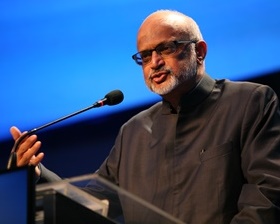
Professor Madhav Das Nalapat, Director of Geopolitics and International Relations and UNESCO Peace Chair at Manipal University in India.
Dr. Edwin Feulner, the Founder, Chairman of the Asian Studies Center, and Chung Ju-yung Fellow at the Heritage Foundation, recalled his deep personal ties with Asia, the bonds of friendship between the United States and today’s Philippines that trace back to the presidency of Andrew Jackson in the early nineteenth century. He emphasized the commitment of the United States to the Philippines and Korea in times of war, and America’s role in fostering growth and the improvement of living conditions in recent decades. While acknowledging shortcomings in the past and ongoing challenges, he urged that democratic traditions take root and said that in his visit to the country he came “face to face with their greatest asset: the human capital of the Philippines.”
Keynote address calls upon moral and innovative leadership
Delivering the keynote address, Global Peace Foundation Founder and Chairman Dr. Hyun Jin Preston Moon emphasized the growing influence and economic dynamism of the Pacific Rim and Southeast Asia, and more broadly the importance of the southern hemisphere in the twenty-first century.
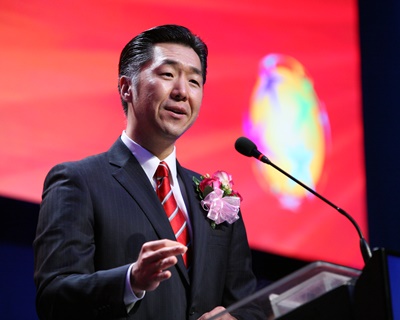
Global Peace Foundation Founder and Chairman Dr. Hyun Jin Preston Moon
Calling the Philippines, “my second home in Asia,” and reminding the assembly that Manila hosted GPF’s first Global Peace Convention in 2009, he movingly paid tribute to the Philippines national motto: Maka-Diyos, maka-tao, maka-kalikasan, at maka-bansa, “For the love of God, people, nature and country.”
Recognizing that such an uplifting ideal did not well describe contemporary world affairs, Dr. Moon said that the convention theme, “Moral and Innovative Leadership: New Models for Peace and Development” was timely and relevant not only in the context of the United Nations campaign to achieve the Sustainable Development Goals by 2030 but in the human quest “for genuine peace based on liberty, individual rights and just governance.”
“The year 2016 was certainly one of considerable turmoil, challenge and change,” the GPF chairman said.
“We urgently need a unifying vision; we need to recognize the vital importance of the self-evident, transcendent truths that define our common humanity; and we need to build consensus around shared values to undergird the creation of vibrant, prosperous, ethical societies.” Dr. Hyun Jin Moon
“Failed top down models and the status quo are giving way to the rise of populist movements that champion the concerns of those who feel left out or overrun in rapidly changing social landscapes.
“We urgently need a unifying vision; we need to recognize the vital importance of the self-evident, transcendent truths that define our common humanity; and we need to build consensus around shared values to undergird the creation of vibrant, prosperous, ethical societies.
Dr. Moon then presented the case of the divided Korean peninsula, and the threat the division posed not only to the South, but to Asia and the world. Referencing his recent book Korean Dream, he cited three major prerequisites to realizing the dream of one united Korea.
- First, shared vision based on universal principles, specifically the historic ethic familiar to all Koreans, called Hongik Ingan.
- Second, the extended family as a fundamental institution providing order, stability and continuity in human relations.
- And third, a welcoming spiritual environment, which he credited to Korean society and heritage, enabling Koreans to invite and adopt all the major religious traditions from around the world. Significantly, he added, “religion was not separate from governance but, instead, informed it.”
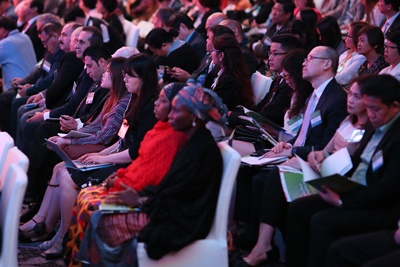
Participants represent 40 countries and diverse nationalities, ethnicities, religious practices and cultures.
He also observed that a bottom-up approach which tapped into the self-reliant spirit and community resilience of the Korean people to building national identity, was essential to South Korea’s rise from abject poverty after the Korean War. “Civil society organizations can serve as important catalysts for change,” he noted, adding that technology and social media could ignite the spark of freedom in repressive societies like North Korea.
Thanking the many grass roots leaders who have invested in community impact programs, Dr. Moon concluded, “This seventh Global Peace Convention reflects the most promising models of peace and development forging a greater force for good that can transform the thunderclouds of warring tensions around us to a new era uplifting our common humanity. Let us unleash this renaissance of character, service, enterprise, scholarship and peace for the good of our world.”
The Global Peace Convention concludes on March 2 with a One Korea Global Peace Concert with leading K Pop stars to raise awareness about Korean unification.

